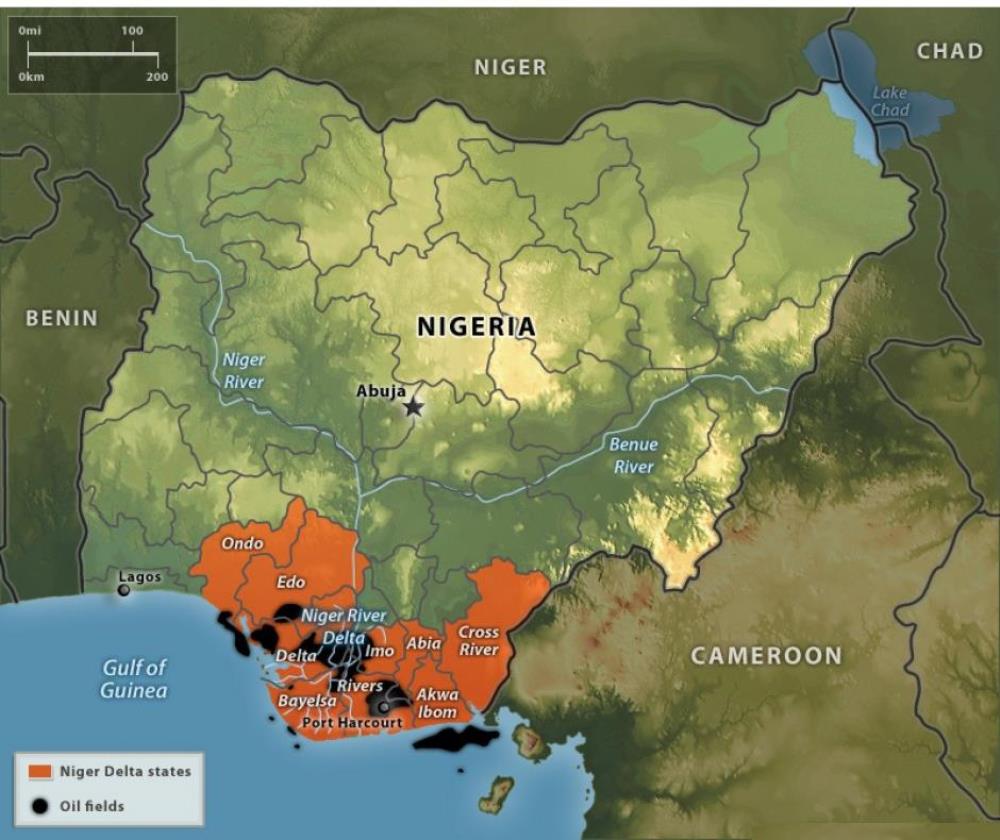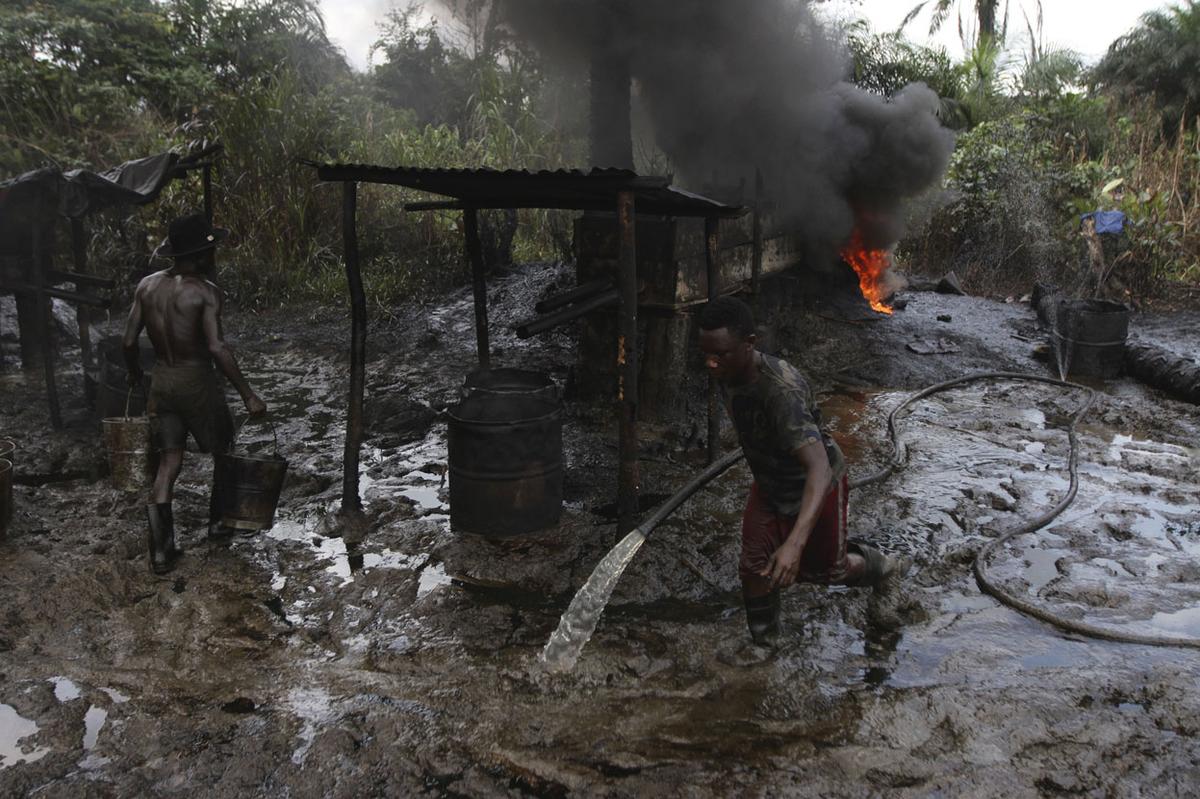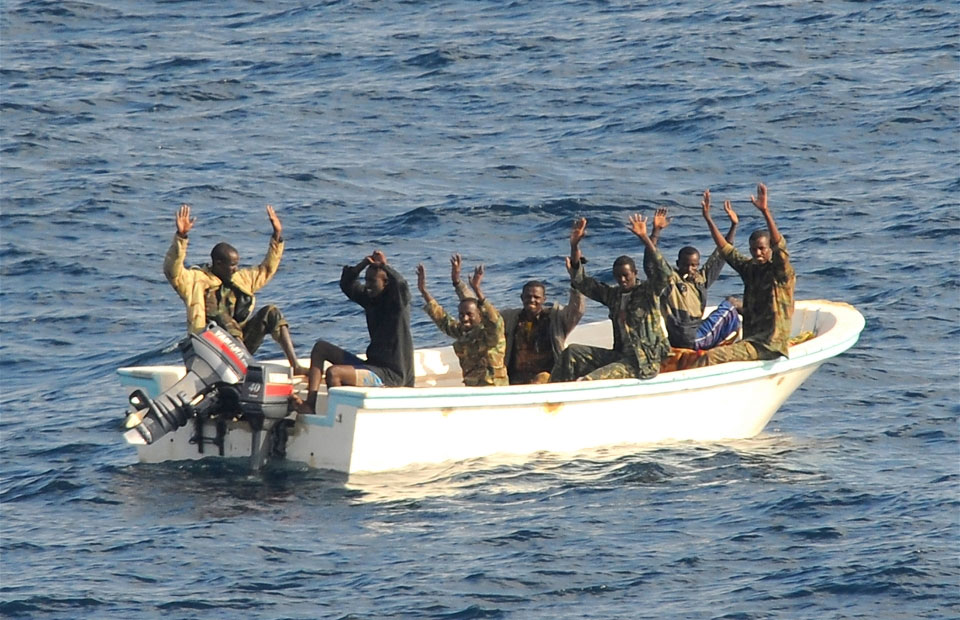Above: suspected pirates surrender during a counter-piracy operation in the Gulf of Guinea. Source: US Navy
In June 2013 the Gulf of Guinea overtook the Somalian coast as the main maritime piracy hotspot in Africa (1). Whilst pirate activities around the Horn of Africa made international headlines and received a strong international response, events in the Gulf of Guinea have often gone under-reported. Maritime crime, including piracy, illegal fishing and trafficking, costs the region more than $2 billion annually (1). Combined with increased instability in the Niger Delta region, piracy seriously hampers the development and security of countries in the Gulf of Guinea, and negatively affects the energy security of the US and Europe (2).
The Gulf of Guinea stretches from Liberia to Gabon on the west coast of Africa, and is strategically important for a number of reasons. Nigeria and Angola are big producers of crude oil (1); the Gulf of Guinea supplies 15% of US and 20% of European oil needs (3). The European Commission has identified illegal fishing as a key risk for its activities in the Gulf of Guinea (4). The region is a portal for the trafficking of drugs and weapons into West Africa and beyond, as well as a large producer of gold, diamonds and timber (5). Finally, the Gulf of Guinea is a major shipping zone, with $10 billion worth of regional trade with the UK alone passing through its waters (6).
A key area for piracy in the Gulf of Guinea is the Niger Delta region of Nigeria. Whilst Nigeria has the largest population in Africa and is ranked by the IMF as the 22nd largest economy in the world, oil production in the Niger Delta has been chronically mismanaged. Exploitation by foreign oil companies, combined with governmental corruption and a lack of development, has laid the groundwork for piracy to flourish in the region (5).
The Problem
Since 2004 there has been an increase in the incidence of piracy in the Gulf of Guinea. Attacks generally occur in a similar style: between three and fifteen pirates in one or two speedboats approach the target vessel, often firing upon it to intimidate the crew (2). Once aboard the pirates detain the crew. Although previously the main aim of the pirates was to hijack vessels in order to sell the cargo (such as oil), in recent years there has been a shift in focus towards kidnapping for ransom (2). This shift from theft to kidnapping has been attributed to a decrease in global oil prices and an improvement in regional maritime security (2). Crew members, especially high value targets such as officers and engineers, are taken to ‘hideouts’ in the Niger Delta, remote locations that are difficult to access (2). They are then ransomed; although figures are not generally released, the crew of one vessel was ransomed for $400,000 in 2015 (7).
From 2005 to 2007 the number of incidents rose from 23 to 60 (8). A decrease was seen from 2008 to 2010 due to an amnesty for militia members operating in the Niger Delta region (8). An increase in violence both on land and at sea was seen following the election of President Buhari in Nigeria in 2015 amid fears he may put an end to the amnesty (9). It must also be remembered that these figures should serve as a baseline only; fear of future reprisals means that events are often not reported. The true number of incidents is therefore likely to be much higher (10).
The Cause
According to one source “maritime piracy in Nigeria is directly linked to oil development and the resulting economic, social, and environmental conditions in the Niger Delta” (11). Piracy originating from the Niger Delta accounts for 80% of the total reported piracy in the Gulf of Guinea (8).
Commercial oil production in Nigeria began in the late 1950s, with the country gaining independence from Britain in 1960 (12). Although the production of oil promised a bright future for Nigeria, the country suffered through multiple military coups and a civil war that lasted three years and resulted in the deaths of over 1 million people (12). This lack of stable governance stalled economic growth and bred corruption, with little trickle down from oil revenues (5). Traditional agricultural practices, such as cocoa and rubber production were marginalised, and a constitutional amendment in 1978 allowed the government to seize land, which was then handed over to oil companies for oil extraction (13).
In the Niger Delta, a large river delta in the south of the country where much of Nigeria’s oil is located, local groups became increasingly disaffected by the destruction and pollution of their land, the poor distribution of oil revenues to the indigenous people and the lack of development in the region (14). In the 1990s movements advocating indigenous rights were spearheaded by the Ogoni and Ijaw peoples, but were repressed by the military juntas which ran the country.
Through the 1990s and 2000s, competition for oil revenues and ethnic tensions led to the increasing militarisation of the Niger Delta region (14). Although groups such as the Movement for the Emancipation of the Niger Delta (MEND) claim to have ideological reasons for their actions, in reality the groups primarily exploit the instability in the region for their own ends (15). This includes the practice of ‘bunkering’, illegally tapping into oil pipelines to steal oil, which is then sold to other regions of Africa (15). Such practices are extremely lucrative for the militia groups, netting them billions of dollars in revenue, but are also extremely damaging to the environment (15). The groups also engage in other illegal activities including kidnapping oil workers, bombing oil facilities, and piracy (14). Groups such as MEND both engage in piracy themselves, or trade weapons and equipment with pirates (5).
Anger over the exploitation and pollution of indigenous lands, a lack of investment in the region, poverty, increased militarisation and unemployment all drive the increase in piracy in the last 15 years (5) (14).

Location of the Niger Delta within Nigeria, showing its large oil fields. Source: al-Jazeera Centre for Studies
Current Anti-piracy Measures
Since 2011 the US-led ‘Obangame Express’ exercises have helped to train military forces along the west coast of Africa counter illegal maritime activities (3). Up from only nine countries in 2011, the 2017 exercise brought together more than 30 countries from Africa, Europe and the Americas, deploying more than 50 military ships (3). The annual exercise evaluates cooperation between countries according to the 2013 Yaoundé Code of Conduct, which also established a maritime security coordination centre in Yaoundé, Cameroon. This centre improves coordination and cooperation between countries in the Gulf of Guinea when dealing with maritime crime (16). This agreement between the Economic Community of Central African States and the Economic Community of West African States was followed by the African Union’s 2050 Africa’s Integrated Maritime Strategy in 2014, and the Lomé Charter in 2016, designed to overcome maritime crime in African waters, especially in the Gulf of Guinea (16).
Through Mission Corymbe the French navy maintains a permanent presence in the Gulf of Guinea to protect its strategic interests, and the US and British navies also regularly patrol the area (10). Nigeria has also taken steps to bolster the might of its navy, and private-public partnerships have filled gaps in the Navy’s capabilities. These private companies provide patrol vessels, escort ships and administer secure zones (10). Furthermore, Nigerian security forces provide embarked security for vessels passing through Nigerian waters (10).
Since 2009, an amnesty has been in place to provide monthly payments, vocational training and pipeline-guarding contracts to some 30,000 militants, at a cost of $500 million per year (14). The program has been somewhat successful, bringing some peace to the Niger Delta and increasing oil output significantly, as well as lowering the number of piracy incidents (14). Since being elected in 2015, President Buhari has also declared a war on insecurity and piracy, including military action on land and at sea, and has removed corrupt officials (16).
Improving anti-piracy methods in the future
Experts at a workshop for the African Centre for Strategic Studies in February 2017 recommended stepping up the implementation of integrated national maritime strategies, as well as ensuring national strategies work more effectively with regional or continental strategies (16). The Obangame Express exercises point the way in this respect, emphasising as they do communication and collaboration between countries. Increasing collaboration and improving region-wide anti-piracy measures would be useful; exclusively cooperative anti-piracy exercises would be especially beneficial.
Although Nigeria has improved its naval capabilities, a large portion of it remains out of commission due to negligence (14). In addition, countries such as Liberia, Sierra Leone and Guinea lack the naval ability to effectively monitor their waters (3). Areas that are not adequately monitored hinder the ability of all countries to combat piracy. Thus steps should be taken to ensure that the territorial waters of those countries are effectively policed.
While it is important to develop anti-piracy measures at sea, piracy in the Gulf of Guinea is primarily a consequence of instability in the Niger Delta (8). To remove the problem of piracy, it will first be necessary to resolve the issues seen in the Niger Delta.
Firstly, revenues from oil production need to be distributed more equitably to the people of the Niger Delta, to remove the economic imperative to resort to piracy. This can be done at the governmental level by allocating more funds to region, and more importantly at a local level by purging corrupt officials and institutions that prevent oil wealth from reaching the people. President Buhari has taken some steps to combat corruption, most notably against Government ‘Tompolo’ Ekpemupolo, a former militia leader. However, corruption remains endemic in Nigeria (17).
Secondly, pressure should be applied to oil companies to clean up the areas of the Niger Delta that have been affected by oil pollution. A UN Environment Programme report recommended oil companies spend $1 billion on oil clean up in the Niger Delta (18). By ruining agricultural land and waterways, oil pollution drives more people towards illegal methods of making a living, and increases hostility towards the government and the oil companies (18). Bunkering and illegal oil refineries also greatly pollute the surrounding areas.

Workers at an illegal oil refinery in Bayelsa State, Niger Delta. Source: Reuters/Akintunde Akinleye
Thirdly, a strategy needs to be found to deal with the militias that disrupt oil production and are behind much of the piracy. If force is to be used, it should carefully target the militias only, and take care not to affect civilians. The use of military personnel should not resort to the brutal reprisals and intimidation of civilians that was seen under the rule of the military juntas. Such activities not only fail to directly address the problem, but also defeat the objective by increasing anti-government sentiment amongst the local population. Military force, as always, should never be the only tactic used, but should be part of a larger strategy. The amnesty that has been in place since 2009 has been somewhat effective, but when it ends and payments to former fighters stop, many fighters will return to militancy. By cancelling the contracts of former militants guarding the pipelines in 2015, the Buhari government precipitated the upsurge in violence and piracy that we saw in 2016(14). Preventing former fighters from returning to militancy is key in the struggle against the militias and against piracy.
Finally, the high population density of the Niger Delta, combined with poor development and employment opportunities, creates a situation that pushes young men especially towards the militia groups. By investing in infrastructure and improving job opportunities, Nigeria can go a long way towards mitigating its problems in the Niger Delta.
The Gulf of Guinea faces several challenges, primarily stemming from instability in the Niger Delta. As a diverse and resource-rich region, the Gulf of Guinea could have a bright and lucrative future if countries are able to work together to combat piracy and other illegal activities at sea, and the continuing mismanagement, pollution and instability of the Niger Delta can be resolved.
References
(1) Tackling Insecurity in West Africa’s Waters. Adjoa Anyimadu, Royal Institute of International Affairs, 21 June 2013. http://www.chathamhouse.org/media/comment/view/192581
(2) Nigerian Piracy in the Gulf of Guinea a Major Risk for Merchant Shipping. Hellenic Shipping News, 27 March 2017. http://www.hellenicshippingnews.com/nigerian-piracy-in-the-gulf-of-guinea-a-major-risk-for-merchant-shipping
(3) US and West Africa join forces on maritime security. Barthélemy Blédé, Institute for Security Studies, 7 April 2017. http://www.issafrica.org/iss-today/us-and-west-africa-join-forces-on-maritime-security
(4) Illegal Fishing and Maritime Security. Catharina Lewerenz, Judith Vorrath, German Institute for International and Security Affairs Comment, January 2015. http://www.swp-berlin.org/fileadmin/contents/products/comments/2015C02_LewerenzVrr.pdf
(5) Piracy in Africa: The Case of the Gulf of Guinea. Matthew Fiorelli, Kofi Annan International Peacekeeping Training Centre, August 2014. http://www.kaiptc.org/publications/occasional-papers/documents/fiorelli-kaiptc-occasional-paper-2014.aspx
(6) Combating Piracy in the Gulf of Guinea. Adeniyi Adejimi Osinowo, Africa Security Brief, February 2015. http://www.africacenter.org/wp-content/uploads/2016/06/ASB30EN-Combating-Piracy-in-the-Gulf-of-Guinea.pdf
(7) Pirates paid ‘$400,000’ ransoms in West Africa’s Gulf of Guinea. Frank Gardner, BBC News, 3 May 2016. http://www.bbc.co.uk/news/world-africa-36191477
(8) The Anatomy of Gulf of Guinea Piracy. Commander Ali Kamal-Deen, Naval War College Review, 2015. http://www.usnwc.edu/getattachment/e95feaa7-8883-4008-b49b-175783f25e43/The-Anatomy-of-Gulf-of-Guinea-Piracy.aspx
(9) Curbing Violence in Nigeria (III): Revisiting the Niger Delta. Crisis Group, 29 September 2015. http://www.crisisgroup.org/africa/west-africa/nigeria/curbing-violence-nigeria-iii-revisiting-niger-delta
(10) Piracy and Robbery Against Ships in the Gulf of Guinea: 2015. Oceans Beyond Piracy, 2015. http://www.oceansbeyondpiracy.org/reports/sop2015/west-africa
(11) The Gulf of Guinea: Military and Non-Military Ways of Combatting Piracy. Major Eero Tepp, Baltic Security and Defence, 2012. http://www.baltdefcol.org/files/files/BSDR/BSDR_14_1.pdf
(12) Biafra: Thirty Years On. Barnaby Phillips, BBC News, 13 January 2000. news.bbc.co.uk/1/hi/world/africa/596712.stm
(13) Oil, Land Alienation and Impoverishment in the Niger Delta, Nigeria. Crosdel Emuedo, Michael Abam, European Journal of Research in Social Sciences, 2015. http://www.idpublications.org/wp-content/uploads/2015/01/OIL-LAND-ALIENATION-AND-IMPOVERISHMENT-IN-THE-NIGER-DELTA-NIGERIA.pdf
(14) The Resurgence of Militancy in Nigeria’s Oil-Rich Niger Delta and the Dangers of Militarisation. Freedom C. Onuoha, al-Jazeera Centre for Studies, 8 June 2016. http://www.studies.aljazeera.net/en/reports/2016/06/resurgence-militancy-nigerias-oil-rich-niger-delta-dangers-militarisation-160608065729726.html
(15) Rivers and Blood: Guns, Oil and Power in Nigeria’s Rivers State. Human Rights Watch, February 2005. http://www.pantheon.hrw.org/legacy/backgrounder/africa/nigeria0205/nigeria0205.pdf
(16) Fighting Rising Piracy in the Gulf of Guinea. Barthélemy Blédé, Institute for Security Studies, 28 February 2017. http://www.issafrica.org/iss-today/fighting-rising-piracy-in-the-gulf-of-guinea
(17) Nigeria’s Uncertain Road to Recovery. Matthew M. Reed, The Fuse, 7 February 2017. http://www.energyfuse.org/nigerias-uncertain-road-recovery
(18) Anger over enduring ‘environmental horror’ in oil-rich, polluted Niger delta. John Vidal, Jesse Winter. The Guardian, 9 November 2015. http://www.theguardian.com/global-development/2015/nov/09/anger-environmental-in-oil-rich-polluted-niger-delta-ogoniland-ken-saro-wiwa
